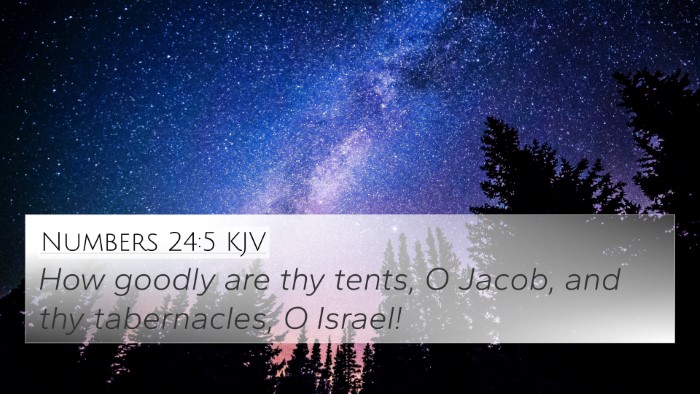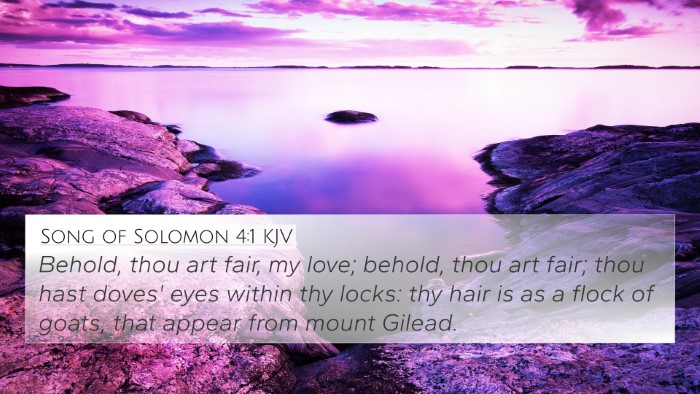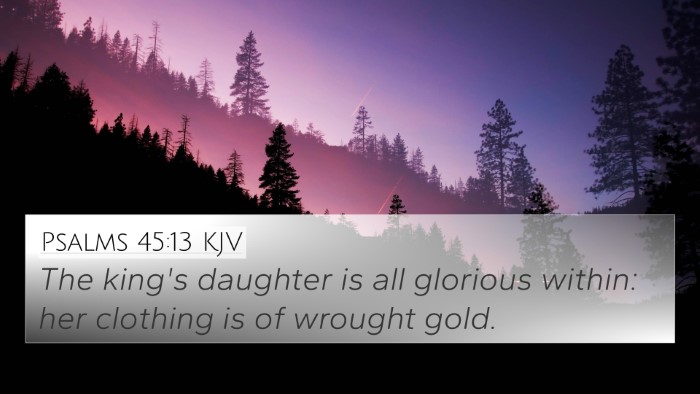Understanding Song of Solomon 4:7
Verse: "Thou art all fair, my love; there is no spot in thee." (Song of Solomon 4:7)
This verse is a declaration of beauty and perfection directed at the beloved in the Song of Solomon. It encapsulates the ideal of love and purity found within biblical poetry, emphasizing the cherished nature of the beloved. Commentaries provide insights that enrich our understanding of this verse.
Verse Meaning and Insights
Song of Solomon 4:7 carries profound significance, as indicated by several respected biblical commentators:
-
Matthew Henry:
Henry interprets this verse as a celebration of the complete beauty of the beloved. He notes that the phrase “no spot” implies not just physical beauty but moral and spiritual perfection. This reflects the believer’s relationship with God, inviting readers to acknowledge the purity and righteousness that should characterize their lives.
-
Albert Barnes:
Barnes emphasizes the unconditional love expressed in this verse. He mentions that the use of “all fair” indicates an encompassing admiration. The absence of a “spot” symbolizes that love, in its truest form, sees beyond flaws and imperfections, promoting a message of acceptance and restorative love.
-
Adam Clarke:
Clarke interprets the verse as highlighting the ideal qualities that encompass the beloved. He points out that the descriptions are not merely superficial but go deeper into the character and essence of the individual being admired. This echoes the biblical principle of love being supportive and uplifting.
Thematic Connections
This verse invites connections to various biblical themes, reflecting God's love for His people and the ideal relationship between lovers. The following themes arise:
- Purity and Perfection: The theme of love reflecting purity can be cross-referenced with Matthew 5:8, "Blessed are the pure in heart: for they shall see God."
- Adoration and Love: The expression of pure love in 1 John 4:19, "We love him, because he first loved us," mirrors this call to love without reservation.
- Moral Beauty: The moral perfection indicated can be linked to Psalms 119:1, where it says, "Blessed are the undefiled in the way, who walk in the law of the Lord."
- Spiritual Union: The relationship echoed in Song of Solomon finds parallels in John 15:9, "As the Father hath loved me, so have I loved you: continue ye in my love."
- The Concept of Beauty: The biblical depiction of beauty resonates with 1 Peter 3:3-4 which speaks to the inner beauty of a gentle and quiet spirit.
- Faithfulness: This concept ties into 2 Timothy 2:13, "If we believe not, yet he abideth faithful: he cannot deny himself," emphasizing the faithful nature of love.
- Divine Affection: The divine love portrayed in Isaiah 43:4, "Since thou wast precious in my sight, thou hast been honorable, and I have loved thee," also parallels the affection found here.
Cross-Referencing Biblical Texts
Cross-referencing this verse with others sheds light on the consistent themes of love, purity, and beauty found throughout scripture:
- Song of Solomon 2:10: “My beloved spake, and said unto me, Rise up, my love, my fair one, and come away.”
- Proverbs 31:30: “Favour is deceitful, and beauty is vain: but a woman that feareth the Lord, she shall be praised.”
- 1 Corinthians 13:4-7: Encompassing the attributes of love that are vital to Christian relationships.
- Revelation 21:2: The portrayal of a beautiful New Jerusalem, reflecting God's ultimate love.
- Ephesians 5:27: “That he might present it to himself a glorious church, not having spot, or wrinkle, or any such thing; but that it should be holy and without blemish.”
Conclusion
Song of Solomon 4:7 reflects the beauty of love that is both seen and inherent. The themes of purity, admiration, and unconditional love resonate deeply throughout scripture. Utilizing tools for Bible cross-referencing enriches our understanding of how these texts relate, allowing for a comprehensive exploration of the Bible’s teachings on love.
By engaging with comparative Bible verse analysis, readers can uncover links between beloved texts and understand the overarching narrative of divine love and human relationships as portrayed in the scriptures.
By examining verses such as John 15:13, “Greater love hath no man than this, that a man lay down his life for his friends,” we see a powerful connection to the selfless love depicted in Song of Solomon 4:7.













